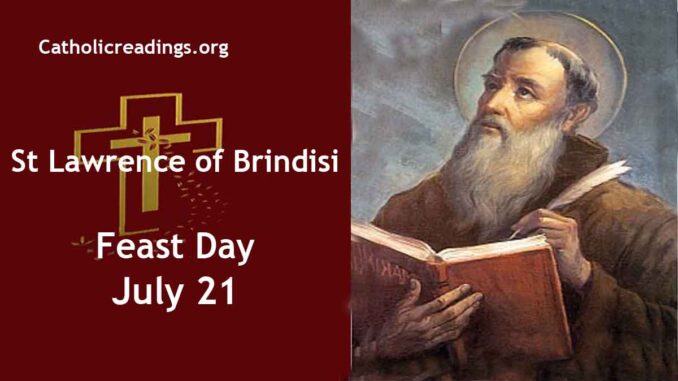St Lawrence of Brindisi was also called Julius Caesar Rossi, Giulio Cesare Russo or Lorenzo da Brindisi.
He was a Roman Catholic priest of the Order of Friars Minor Capuchin and a theologian.
He was born on July 22 1559 in Brindisi, Italy and died on July 22 1619 in Lisbon, Portugal.
His feast day is celebrated on July 21 but in Lisbon, Portugal they celebrate on July 22.
| Saint Lawrence of Brindisi Biography | |
|---|---|
 |
|
| Date of Birth | July 22 1559 |
| Place of Birth | Brindisi, Italy |
| Profession | Priest and Doctor of the Church |
| Place of Work | Lisbon, Spain |
| Date of Death | July 22 1619 |
| Place of Death | Lisbon, Portugal |
| Feast Day | July 21 |
| Beatification | By Pope Pius VI on June 1 1783 at Saint Peter’s Basilica in the Papal States |
| Canonization | By Pope Leo XIII on December 8 1881 in Saint Peter’s Basilica, Italy |
| Patron Saint of | Brindisi |
Saint Lawrence of Brindisi Life History
Saint Lawrence of Brindisi was born with the name Giulio Cesare Russo in Brindisi, Kingdom of Naples, Italy.
His father’s name was Guglielmo de Rossi and his mother’s name was Elisabetta Masellato. His parents died when he was twelve years old and therefore, he was raised by his uncle.
In his early years, he was educated by the Friars Minor Conventuals of Brindisi, Italy, and later schooled at Saint Mark’s College in Venice.
Giulio Cesare Russo joined the Capuchins in Verona as Brother Lorenzo in 1575 at age 16. He joined the University of Padua and studied theology, the Bible, German, Spanish, French, Hebrew, Greek and Syriac and became very proficient in those languages. At the age of 23, St Lawrence was ordained a priest.
St Lawrence was elected superior of the Capuchin Franciscan province of Tuscany at the age of thirty-one and in 1596, appointed the definitor general to Rome for the Capuchins.
While in Rome, Pope Clement VIII gave him the assignment of preaching to the Jews in the city. The rabbis there thought he was a convert from Judaism because of his proficiency in the Hebrew language.
From 1599, St Lawrence established Capuchin monasteries in Vienna in Austria, Graz in Austria and Prague in the Czech Republic. This led to many protestants coming back to the Catholic faith.
In 1601, he served as the chaplain for the Holy Roman Empire army of Rudolph II and successfully marshaled Philippe Emmanuel, Duke of Mercœur, to assist in fighting against the Ottoman Turks.
Armed only with a crucifix, he also led the army into battle at Stuhlweissenburg, now modern-day Székesfehérvár in Hungary, and defeated the Turkish army.
In 1602, he was elected as the vicar general of his Order, the Capuchin Friars, until 1605 but upon reelection, in 1605 he declined the offer.
He became the papal nuncio and led successful diplomatic peace missions to Munich in Germany and Madrid in Spain.
He became the commissary general of the Capuchin friars for Tyrol and Bavaria in Germany and Spiritual director of the army in Bavaria.
In 1618, he retired to Convento Di San Francesco monastery in Caserta, Italy but in 1619, he was recalled to become a special envoy to the King of Spain.
He was to intercede with King Philip for the rulers of Naples against the Duke of Osuna, a Spanish envoy to Naples, and convinced the King to recall the Duke to avert an uprising.
St Lawrence of Brindisi Birth
He was born on July 22 1559 in Brindisi, Italy of Guglielmo de Rossi his father, and Elisabetta Masellato his mother.
St Lawrence of Brindisi Death
When his mission in 1619 was completed he died in Lisbon, Portugal on July 22 1619, his birthday.
Relics
St Lawrence of Brindisi’s remains are interred at the Poor Clares’ Convent of the Annunciation (Convento de la Anunciada) in Villafranca del Bierzo, Spain.
St Lawrence of Brindisi Works
The complete works of St Lawrence of Brindisi were published between 1926 and 1956 in 15 volumes. They comprise;
- Sermones de tempore
- Sanctorale
- Quadragesimale tertium
- Quadragesimale secundum
- Quadragesimale quartum
- Quadragesimale primum
- Mariale
- Lutheranismi hypotyposis
- Explanatio in Genesim
- Dominicalia
- Adventus
Beatification and Canonization
St Lawrence of Brindisi was beatified by Pope Pius VI on June 1 1783 at Saint Peter’s Basilica in the Papal States and canonized by Pope Leo XIII on 8 December 8 1881 in Saint Peter’s Basilica, Italy. He was proclaimed a Doctor of the Church by Pope John XXIII in 1959.
St Lawrence of Brindisi Feast Day
His feast day is celebrated on July 21 every year in the Catholic Church as an optional memorial but in Lisbon, Portugal they celebrate on July 22.
Attributes
St Lawrence of Brindisi is attributed with
- Leading soldiers against the Turks
- With the Infant Jesus
Related Links
Powered By SEO Experts
Follow @ReadingCatholic
